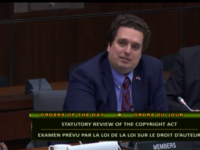David Graham was not your typical Member of Parliament. A Liberal MP from the Quebec riding of Laurentides-Labelle, Graham brought a background in open source issues to Parliament Hill. Over his four years as an MP, Graham was seemingly everywhere when it came to digital policy. Whether in the House of Commons talking net neutrality, the Industry committee copyright review or the Ethics committee work on privacy, Graham emerged as the rare MP equally at home in the technology and policy worlds. Graham’s bid for re-election fell short, but this week he joins the Lawbytes podcast to reflect on his experience in Ottawa with thoughts on copyright, privacy, technology policy, and the use of digital tools for advocacy purposes.
Search Results for "five eyes" : 20
You’re on Your Own: How the Government Wants Canadians To Sacrifice Their Personal Security
Another week, another revelation originating from the seemingly unlimited trove of Edward Snowden documents. Last week, the CBC reported that Canada was among several countries whose surveillance agencies actively exploited security vulnerabilities in a popular mobile web browser used by hundreds of millions of people. Rather than alerting the company and the public that the software was leaking personal information, they viewed the security gaps as a surveillance opportunity.
My weekly technology law column (Toronto Star version, homepage version) notes that in the days before Snowden, these reports would have sparked a huge uproar. More than half a billion people around the world use UC Browser, the mobile browser in question, suggesting that this represents a massive security leak. At stake was information related to users’ identity, communication activities, and location data – all accessible to telecom companies, network providers, and surveillance agencies.
Your Government is Spying on You Online. Here’s What You Can Do About It
Appeared in the Toronto Star on May 23, 2015 as Your Government is Spying on You Online. Here’s What You Can Do About It Another week, another revelation originating from the seemingly unlimited trove of Edward Snowden documents. Last week, the CBC reported that Canada was among several countries whose […]
Citizen Four and the Canadian Surveillance Story
Citizen Four, Laura Poitras’ enormously important behind-the-scenes documentary film on Edward Snowden, won the Academy Award last night for best documentary. The film is truly a must-see for anyone concerned with privacy and surveillance. It not only provides a compelling reminder of the massive scale and scope of surveillance today, but it also exposes us to the human side of Snowden’s decision to leave his life behind in order to tell the world about secret surveillance activity.
Canada is not mentioned in the film, but that is not because we have been immune to similar surveillance activity. In the months since the Snowden revelations began, there have been many Canadian-related stories including reports on G8/G20 spying, industrial spying in Brazil, the “airport wifi” surveillance program, and the massive Internet download surveillance program.
Responding to the Attacks: Why We Need to Resist Quick-Fix Anti-Terrorism Measures
Two shocking terror attacks on Canadian soil, one striking at the very heart of the Canadian parliament buildings and both leaving behind dead soldiers. Office buildings, shopping centres, and classrooms placed under lockdown for hours with many confronting violence first hand that is rarely associated with Canada.
Last week’s terror events will leave many searching for answers and seeking assurances from political and security leaders that they will take steps to prevent it from happening again. There will be an obvious temptation to look to the law to “fix” the issue, and if the past is a guide, stronger anti-terror legislation and warnings that Canadians may need to surrender more of their privacy and civil liberties in the name of greater security will soon follow.
My weekly technology law column (Toronto Star version, homepage version) notes that if there are legal solutions that would help foster better security, they should unquestionably be considered. Yet Canada should proceed with caution and recognize that past experience suggests that the unintended consequences that may arise from poorly analyzed legislation may do more harm than good.










